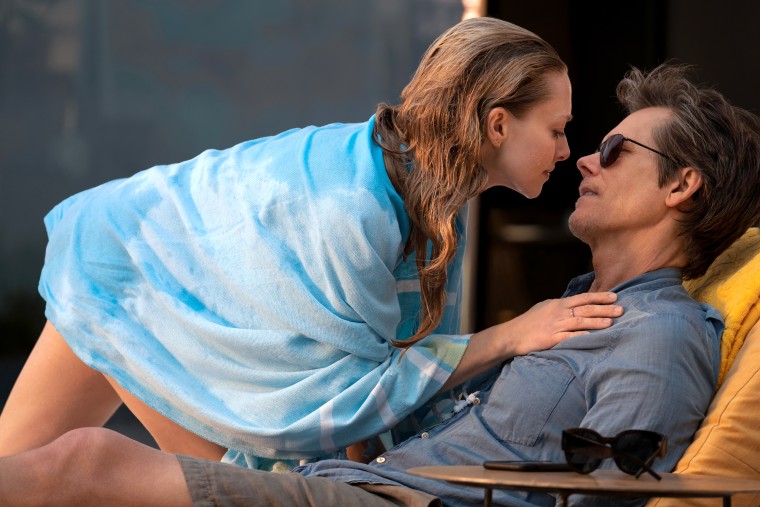Horror flicks, rather than historical dramas, can sometimes seem like the single most accurate representation of the American psyche. And, as Black Lives Matter protesters take to the streets in defiance of police who literally get away with murder and the #MeToo movement continues to shine a light on workplace predators, we are currently — finally asking — what to do with people whose positions in life have shielded them from the consequences of their cruelty.
Thus, whether we apply punishment retroactively or shrug it off to everyone’s detriment is the question — though not the answer — you will find in "You Should Have Left," a pleasant (if slightly old-fashioned) horror movie written and directed by David Koepp.
In it, Kevin Bacon plays Theo Conroy, the bad man in question — though how bad, we’re not ever quite sure. We are pretty sure that Theo’s currently got everything going for him: a beautiful, much younger second wife Susanna (Amanda Seyfried), their adorable six-year-old (Avery Essex) and an unnamed source of enormous wealth that means he can spend most of his day lounging by the pool listening to guided meditation and trying not to have nightmares about the suspicious death of his first wife. He’s a selfish, possessive, passive-aggressive man. Is that all he is?
I suppose I should play coy for fear of spoiling the plot here but Bacon — still one of the most reliable actors working — never really allows the audience to think of Theo as anything but guilty (though in what fashion, we don’t know) of his wife’s murder.
It’s neither Bacon nor Koepp’s first rodeo: The movie is adapted from the 2017 novella of the same name by German writer Daniel Kehlmann, but in Koepp’s hands, it recalls the work of "Twilight Zone" fixture Richard Matheson, who wrote Koepp's other collaboration with Bacon, the 1999 ghost flick "Stir of Echoes." The trailer all but announces that the movie’s supernatural twists and turns will mostly be a matter of Theo getting what’s coming to him, which was Matheson’s preoccupation, too — the supernatural expression of normal horror.
The surprise — and it’s a good one and thus impossible to spoil — is that Theo is mostly at war with himself, and not just with the forces of darkness that lure him to Wales and a secluded house that is all rectangles and taupe brick. His wealth, privilege and status have thus far insulated him from real consequences; he’s so famous for the crime he apparently got away with that people recognize his name and are visibly uncomfortable in his presence. Still, all the introspection this seems to prompt from him is angry writing in his journal, asking himself “WHEN DOES IT END?!” and snipping cruelly at his wife. (Seyfried’s performance is a perfect highlight to Bacon’s, her warmth setting off his frigidity.)
Of course, this being a haunted house movie, further consequences for Theo are, actually, hidden in said Airbnb in the Welsh countryside, apparently posted — like so much else on the internet — by Satan himself.
The house is bigger on the inside than on the outside; sometimes doors appear that weren’t there before and disappear for no reason. Reflections reflect ... other things. "You Should Have Left" isn’t an all-out screamer like, say, "Hereditary" (I’m honestly not sure why it’s rated R, other than that PG-13 movies are de facto children’s entertainment these days), but that seems to be by design. The house isn’t just there to scare and eventually murder Theo; first it wants him to admit what he’s done wrong.
And that, more than anything, seems to be the kind of catharsis we lack in our news coverage of bad men doing bad things. Increasingly, pop culture news is filled with just such tales of celebrities testing the limits of behavior their fame might excuse. A cartoonist is accused of seducing teenage girls; a popular comedian allegedly solicits nude photos from a 16-year-old fan. Often, the conversation focuses on — and stops at — how we can mete out punishment for these offenses, but the problem is thornier than that.
Plenty of people like Theo have lost careers or positions of power — and hopefully those changes have made the people they might have encountered safer — but we’ve seen precious little reckoning by them for their agency in their sins.
Men aren’t an alien species unnaturally prone to doing evil; we’re simply left in positions of authority where we’re allowed to do bad things with little or no repercussion, and our society is built around leaving us in those positions. For Theo Conroy, tortured by his rental house, the question is not whether monsters will make him pay for his crimes — they definitely will. The question is whether he’ll admit he committed them in the first place, and whether, in doing so, he'll become less of a monster himself.


